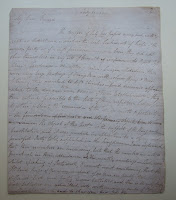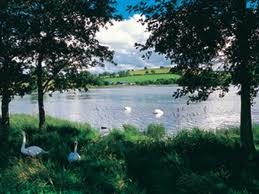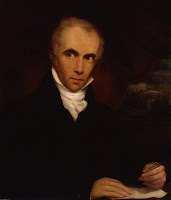My Dear Mich …
 |
| TPCK/6/3/5 - Letter from Dr Mills |
This month's archive item of the month is a series of letters from Dr Thomas Mills to his brother Michael. They form part of Dr Kirkpatrick's collections of manuscript material which he bequeathed to the College. The full list of Dr Kirkpatrick's collection can be downloaded here.
Thomas Mills was born c.1773, he graduated as a doctor of Medicine from Edinburgh University in 1797, and four years later he passed the licentiate exam of the King and Queen's College of Physicians. One of Dr Mills' first positions following his qualification was in Loughbrickland in County Down. It was following his arrival here that Dr Mills wrote this series of over 40 letters to his brother Michael in Dublin. The letters contain a mixture of family news, descriptions of the locality, customs and traditions, and some reports of his medical practice.
 |
| Loughbrickland Lake, County Down |
At the beginning of July 1805 Dr Mills sent his brother a series of letters were detailed descriptions of the type of land and cultivation around his new home. The poor quality of the soil in the area is clear in his description of the agriculture,
'Potatoes are everywhere planted, we see them in almost every garden, and, perhaps, one fifth or one sixth part of the land is applied to the cultivation of this useful vegetable – there is little pasture ground and little meadow, not more than is barely sufficient to supply the domestic cattle.'
Despite these hardships, Dr Mills admires both the fairness of the landlords and the spirit of the tenants
'they are all anxious to give their children instruction, & the poorest cottager never fails to send his child to school'.
The religious differences of the people are also discussed in the letters
'I find with sorrow that a great diversity of opinion, and, I fear, some degree of jealousy and hatred, still subsists between people of different persuasions in this neighbourhood – and what may appear, still more extraordinary, that schism are taking place, between the professors of the same religion.'
Despite these differences, Dr Mills reports that 'the twelfth of July has passed away and without riot or disturbance', going on to report on the Orange marches in the local towns and other celebrations that took place.
As well as describing his new home, the letters also deal with practical family matters, such as whether the Mills brother's mother and sisters would be better to settle in Dublin or Loughbrickland. Dr Mills is of the opinion that Dublin offers the best value in terms of provisions and supplies, and that Dublin would also be better for their sisters.
'The girls ought to have every fair opportunity of being settled – they are good and amiable – and will make most excellent wives – but in this place, they cannot get husbands – they cannot become wives – for there are no young men here'.
 |
| RCPI 5 - Portrait of Thomas Mills |
Dr Mills did not remain long in Loughbrickland, he soon returned to Dublin where he worked in St. George's Fever Hospital and the Cork Street Fever Hospital. He published a number of works on medicine, which are available in the Dun's Library, including An Essay on the Utility of Blood-Letting in Fever (1813) illustrated with cases and results from his own practice.
Thomas Mills died in Nice on 6th November 1830, and was buried there. There is a memorial to him in Clondalkin Churchyard which records
'This monument is erected to the memory of Thomas Mills Esq. MD, who died at Nice on the 6th of November 1830 at the age of fifty seven. For nearly 30 years he had been an eminent physician of the City of Dublin, and contributed greatly to the improvement of the profession of which he was so conspicuous an ornament'.